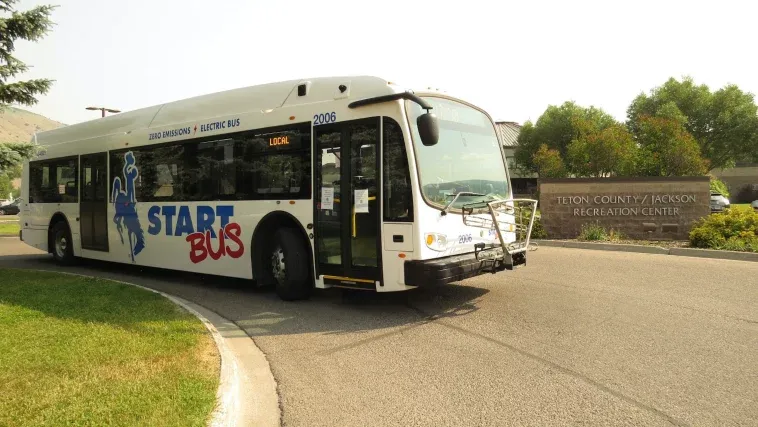(Cowboy State Daily) Teton County and the town of Jackson had set its sights on a low-emission transit system for the county.
The Southern Teton Area Rapid Transit (START) system, a joint operation between Jackson and Teton County, bought eight electric buses to complement its fleet of 31.
But none of the electric buses are running, and so the town’s transit system is relying on its diesel fleet.
Bankruptcy
Last month, the electric bus manufacturer that supplied START, California-based Proterra, filed for Chapter 11 bankruptcy.
The Jackson Hole News & Guide reports that the last of the electric buses went out of service two months ago, and some of the broken buses have been awaiting parts for months.
START Director Bruce Abel told Cowboy State Daily that the agency still isn’t sure when those parts will come or when its electric fleet will be running again.
“We’re evaluating our options to see how we can work through that and make sure that they can be on the road,” Abel said.
The company plans to continue operating while the bankruptcy case proceeds, and it’s promised to deliver buses that are on order.
Whether that includes filling parts orders is anyone’s guess.
Jackson Councilman Jimbo Rooks told Cowboy State Daily the bankruptcy was a “real punch in the gut.”
Prior to the bad news from Proterra, Rooks said the transit system was well positioned to run clean vehicles charged with wind power and hydroelectric.
“While it’s a very upsetting scenario, we need to learn some lessons, problem solve and move forward to improve regional mobility for our residents and visitors alike,” Rooks said.
Not Very Practical
Paul Vogelheim, a Jackson resident who previously served on the Teton County Commission, told Cowboy State Daily that 15 years ago, he and other residents of the area wanted to improve the county road system to make traffic flow smoothly across the Snake River.
Then, the idea of electric buses became some “noise” along the way, he said, and the road improvements they wanted never materialized.
He said it was difficult to move forward with road projects in a community with a strong voice of “not in my backyard.” He said it would have been better to get out of the way and let the Wyoming Department of Transportation do its job, while influencing projects with the values of the community.
Instead, a majority wanted driving to remain inconvenient in hopes that people would ride more bikes and take public transit, Vogelheim said, adding, “That’s not very practical.”
He said with a good supply of natural gas available, the transit system should have looked into natural gas vehicles.
“We missed the boat there with our electric bus purchases, and obviously a bad choice of vendor,” Vogelheim said.
Biden Approved
Proterra might have seemed like a solid company when the buses were ordered. It enjoyed financial support from federal taxpayers, as well as praise from President Joe Biden.
The Bipartisan Infrastructure Law provided more than $5.5 billion for low- and no-emission buses, each costing around $1 million each.
In 2021 Biden participated in a virtual tour of the company.
“The fact is, you’re making me look good,” the president said.
Biden went on to discuss a plan to build 50,000 charging stations with federal support.
In a press release announcing the company’s bankruptcy, CEO Gareth Joyce said the company faced “various market and macroeconomic headwinds that have impacted our ability to efficiently scale all our opportunities simultaneously.”
Range Shrinkage
When the START electric buses did run, they also suffered from degradation of performance during the winter months, something that plagues electric vehicles of all types.
Abel said that during the summer months, the buses would go all day without needing a charge. When the temperatures dropped, the batteries would lose considerable range. Not only does it not provide as much power, the bus has to be heated, which places further demands on the battery.
So, the electric buses had to return to the depot at midday to recharge. They were replaced by another electric bus, when one was available, or the diesel-powered buses.
“So, there is a difference in performance between cold weather and warm weather,” Abel said.






